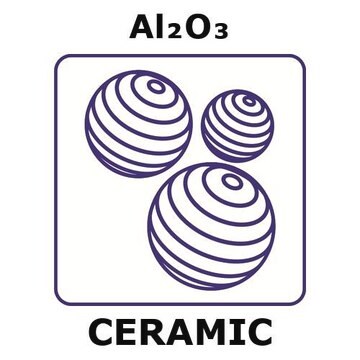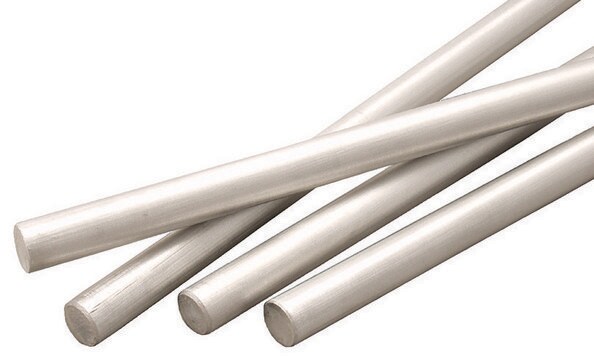GF31334093
Aluminum
wire reel, 0.5m, diameter 0.5mm, as drawn, 99.999%
Sinônimo(s):
Aluminum, AL005172
Faça loginpara ver os preços organizacionais e de contrato
About This Item
Fórmula empírica (Notação de Hill):
Al
Número CAS:
Peso molecular:
26.98
Número MDL:
Código UNSPSC:
12352300
ID de substância PubChem:
NACRES:
NA.23
Produtos recomendados
Ensaio
99.999%
forma
wire
temperatura de autoignição
1400 °F
fabricante/nome comercial
Goodfellow 313-340-93
resistividade
2.6548 μΩ-cm
C × diâmetro
0.5 m × 0.5 mm
pb
2460 °C (lit.)
pf
660.37 °C (lit.)
densidade
2.7 g/mL at 25 °C (lit.)
cadeia de caracteres SMILES
[Al]
InChI
1S/Al
chave InChI
XAGFODPZIPBFFR-UHFFFAOYSA-N
Categorias relacionadas
Descrição geral
For updated SDS information please visit www.goodfellow.com.
Informações legais
Product of Goodfellow
Código de classe de armazenamento
13 - Non Combustible Solids
Classe de risco de água (WGK)
WGK 3
Ponto de fulgor (°F)
Not applicable
Ponto de fulgor (°C)
Not applicable
Certificados de análise (COA)
Busque Certificados de análise (COA) digitando o Número do Lote do produto. Os números de lote e remessa podem ser encontrados no rótulo de um produto após a palavra “Lot” ou “Batch”.
Já possui este produto?
Encontre a documentação dos produtos que você adquiriu recentemente na biblioteca de documentos.
Vesa Riihimäki et al.
Critical reviews in toxicology, 42(10), 827-853 (2012-09-28)
Exposure to aluminum at work is widespread, and people are exposed to several species of aluminum, which differ markedly as to the kinetics and toxicity. Especially welding of aluminum is widely applied and continuously expanding. Inhalation of fine particles of
Sungwon Han et al.
Cell biology and toxicology, 29(2), 75-84 (2013-03-07)
Metal pollutants are a global health risk due to their ability to contribute to a variety of diseases. Aluminum (Al), a ubiquitous environmental contaminant is implicated in anemia, osteomalacia, hepatic disorder, and neurological disorder. In this review, we outline how
Rejane C Marques et al.
Environmental pollution (Barking, Essex : 1987), 187, 130-135 (2014-02-04)
We studied neurodevelopment in infants from two communities. Children living in the vicinity of tin-ore kilns and smelters - TOKS; n = 51) were compared to children from a fishing village (Itapuã; n = 45). Mean hair-Hg (HHg) concentrations were significantly higher in Itapuã
Y Z Zhu et al.
Environmental toxicology and pharmacology, 35(1), 82-87 (2013-01-01)
Aluminum (Al) is widely used in daily life and will lead to environmental release and exposure. The toxicity of Al had been documented, and which attracted a growing concern on human and animal health. The immune system appears to be
Jian-Yong Li et al.
Proceedings of the National Academy of Sciences of the United States of America, 111(17), 6503-6508 (2014-04-15)
Aluminum (Al) toxicity is a major constraint for crop production on acid soils which compose ∼ 40% of arable land in the tropics and subtropics. Rice is the most Al-tolerant cereal crop and offers a good model for identifying Al
Nossa equipe de cientistas tem experiência em todas as áreas de pesquisa, incluindo Life Sciences, ciência de materiais, síntese química, cromatografia, química analítica e muitas outras.
Entre em contato com a assistência técnica



